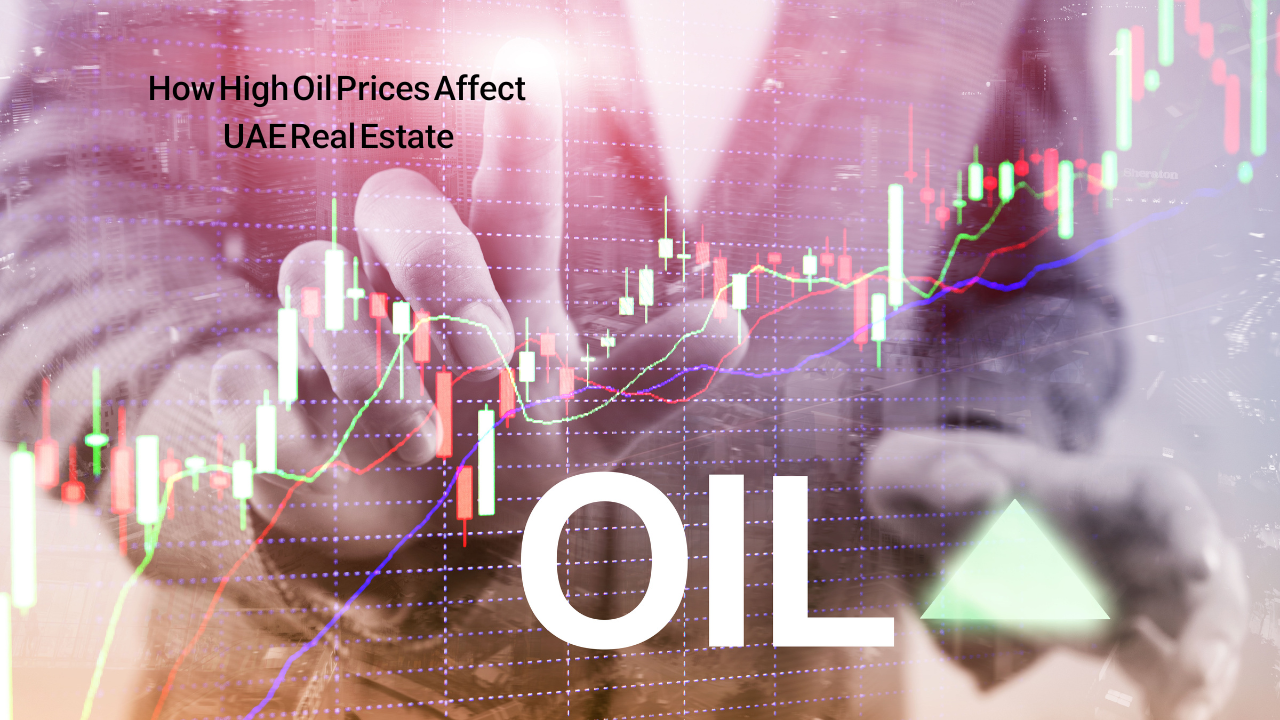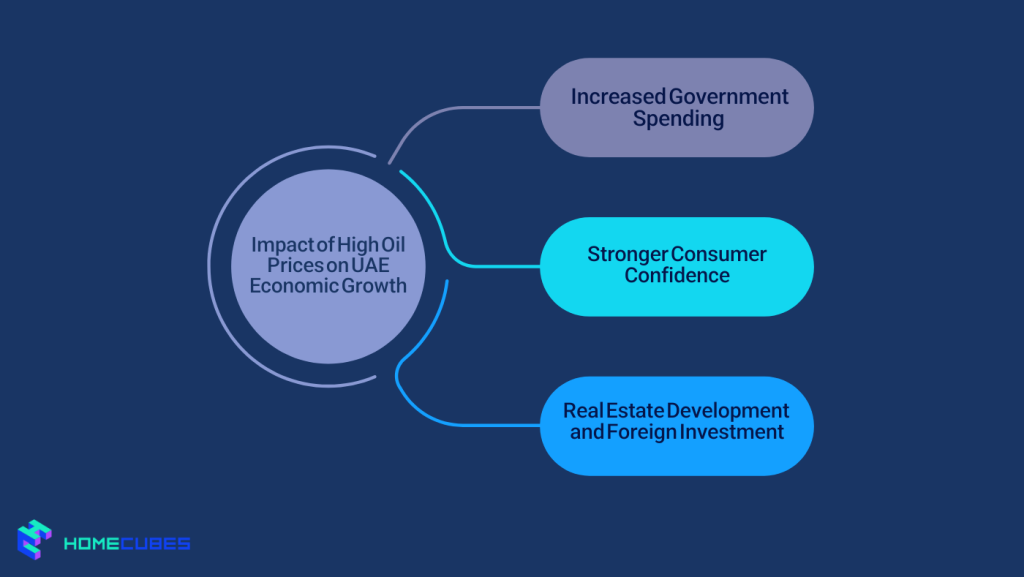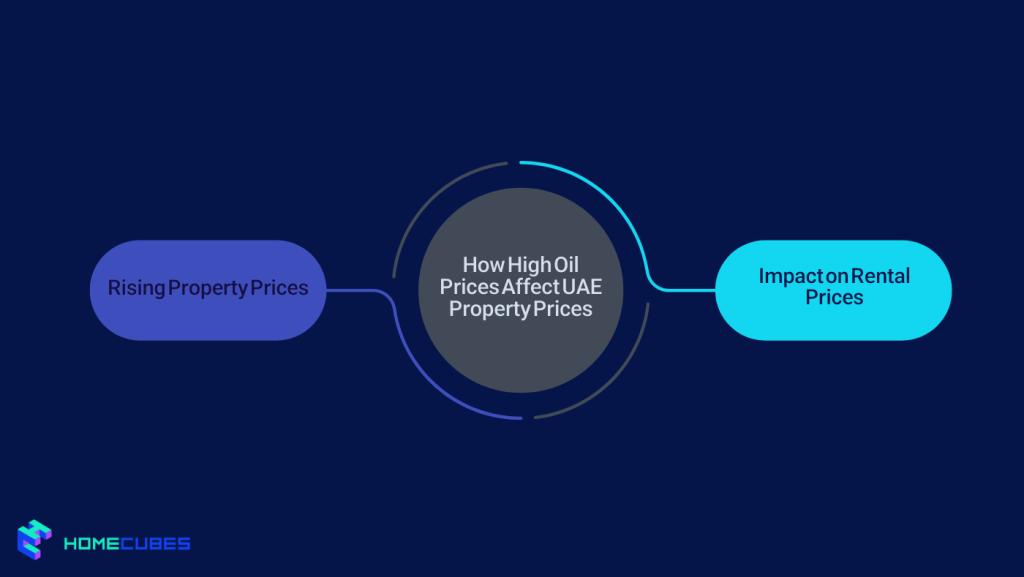

Table of Contents
-
Introduction
-
The UAE Economy and Its Dependence on Oil
-
Impact of High Oil Prices on UAE Economic Growth
-
Increased Government Spending
-
Stronger Consumer Confidence
-
Real Estate Development and Foreign Investment
-
-
The Impact of High Oil Prices on Real Estate Supply
-
Boost in Construction Activity
-
Shortage of Affordable Housing
-
-
How High Oil Prices Affect UAE Property Prices
-
Rising Property Prices
-
Impact on Rental Prices
-
-
Potential Risks of High Oil Prices for UAE Real Estate
-
Volatility of Oil Prices
-
Overdependence on the Oil Sector
-
-
Bottom Line
- FAQ
-
About Homecubes
The UAE, with its oil-driven economy, is deeply influenced by fluctuations in global oil prices. As one of the world’s largest oil producers, the country’s real estate market feels the effects of high oil prices. The relationship between oil prices and UAE real estate is complex and multifaceted. When oil prices rise, it can have both direct and indirect impacts on property markets. Understanding these effects is crucial for investors, homeowners, and developers. This article delves into the ways high oil prices affect UAE real estate, exploring economic, investment, and market trends.
The UAE Economy and Its Dependence on Oil
The UAE economy relies heavily on oil exports, particularly from Abu Dhabi. While the country has diversified its economy over the years, oil still remains a key driver of growth. Fluctuations in oil prices have a ripple effect across various sectors, including real estate. High oil prices usually signal economic growth, while low oil prices can result in economic slowdowns.
In just fifty years, Dubai has transformed from an obscure fishing village into a city of global significance 🇦🇪
And despite popular misconceptions, oil revenues contribute less than 1% of Dubai’s GDP today.
A 🧵 on the remarkable story of Dubai’s development… pic.twitter.com/LAxuIaobKh
— Sam Bidwell (@sam_bidwell) August 25, 2024
Given the UAE’s reliance on the energy sector, any significant rise in oil prices directly impacts government spending, investor confidence, and consumer behavior. These factors ultimately affect the real estate market, making it sensitive to changes in oil price trends.
Impact of High Oil Prices on UAE Economic Growth
When oil prices rise, the UAE economy tends to experience growth. The government, with its substantial oil revenues, is in a better position to invest in infrastructure, development projects, and public services. This, in turn, benefits the real estate market in several ways.

1. Increased Government Spending
High oil prices increase the government’s revenues, which can be reinvested in the economy. The UAE government, particularly in Dubai and Abu Dhabi, uses these funds to enhance public infrastructure, create new developments, and improve transportation networks. With major projects like Expo 2020 and the expansion of key sectors, the demand for both residential and commercial properties tends to rise.
- Infrastructure Development: Investments in roads, bridges, airports, and public transport systems increase demand for real estate near these developments. Areas benefiting from better infrastructure see higher property values.
- Real Estate Projects: The UAE government’s ability to fund large-scale real estate projects, such as luxury residential complexes or commercial buildings, helps stimulate the property market.
2. Stronger Consumer Confidence
Rising oil prices often boost consumer confidence, as individuals and businesses expect an economic upturn. With higher disposable incomes and a positive outlook on the economy, consumers are more willing to make significant investments, such as purchasing real estate. This creates higher demand for residential properties, particularly in the luxury and mid-range sectors.
- Increased Demand for Properties: With more money circulating in the economy, people are more likely to buy or rent properties. This can drive up both sales prices and rental rates in the market.
- Property Investment in Prime Areas: Wealthier buyers, including expatriates and investors, are often drawn to prime areas in Dubai, Abu Dhabi, and other emirates when they feel confident about the economy and their financial future.
3. Real Estate Development and Foreign Investment
High oil prices also attract foreign investment, which plays a crucial role in the UAE’s real estate market. Investors often seek out real estate opportunities in the UAE due to its tax advantages, strategic location, and reputation for luxury developments. Higher oil prices would result in the UAE real estate boom and attract global capital. This is due to foreign investors being more likely to invest in both residential and commercial properties.
- Increased Foreign Investment: High oil prices lead to economic stability, which encourages foreign investors to buy real estate. Investors see the UAE as a stable, lucrative market where their money can grow, further driving property demand.
- Luxury Developments: With strong oil prices, there is often an uptick in the demand for high-end real estate. Developers focus on creating luxury apartments, villas, and commercial spaces for wealthy clients.
The Impact of High Oil Prices on UAE Real Estate Supply
High oil prices don’t just affect demand; they also impact the supply side of the real estate market. With increased government spending and foreign investment, developers are more likely to launch new projects.
1. Boost in Construction Activity
When oil prices are high, developers are more likely to invest in large-scale construction projects. The UAE has seen numerous developments, such as new residential neighborhoods, office buildings, and hotels, particularly in Dubai and Abu Dhabi.
- Increased Housing Supply: Developers tend to increase the supply of housing in high-demand areas, knowing that there will be an influx of buyers and renters due to the overall economic growth spurred by high oil prices.
- Commercial Real Estate Boom: High oil prices can also lead to an expansion in the commercial property sector. With a more favorable economic environment, businesses expand, leading to a need for more office space and retail locations.
2. Shortage of Affordable Housing
While high oil prices boost development in many sectors, they can also exacerbate the shortage of affordable housing. Luxury and high-end projects tend to dominate the market during times of economic growth. Developers may focus more on these properties, which can lead to an imbalance in the housing market.
- Luxury Developments Over Affordable Housing: Developers may prioritize high-end projects over affordable housing due to their higher profit margins. This can leave middle- and lower-income residents struggling to find affordable homes.
- Increased Rental Prices: The focus on luxury developments can drive up property prices and rents in general, making it harder for residents to find affordable housing, particularly in areas with limited supply.
How High Oil Prices Affect UAE Property Prices
High oil prices typically lead to an increase in property prices in the UAE. The relationship between oil prices and UAE real estate is evident when examining the effect of rising oil prices on the market.

1. Rising Property Prices
As oil prices rise, the economy strengthens, and both demand and supply in the real estate market increase. This results in higher property prices, particularly in key areas like Dubai Marina, Downtown Dubai, and Palm Jumeirah. Investors flock to these prime locations to take advantage of growth potential, which drives up property values.
- Premium Locations See High Demand: Areas with already high demand, such as business hubs and luxury communities, see the sharpest increases in property prices when oil prices are high.
- Appreciation in Residential and Commercial Properties: High demand leads to price appreciation, benefiting property owners and investors. Those holding real estate in prime locations often experience significant returns on their investment.
2. Impact on Rental Prices
High oil prices also influence rental prices in the UAE. As more people move to the UAE in search of work, or as businesses expand, the demand for rental properties like leasing a retail space in a top location in Dubai increases. This leads to higher rents across residential and commercial sectors.
- Higher Rental Yields for Landlords: Landlords can command higher rents for their properties, as demand outpaces supply. This is especially true in areas that attract foreign workers and expats.
- Increased Rents in Prime Areas: Areas near business districts, hotels, and major tourist attractions often see significant rent increases. As oil prices rise, the influx of people looking for rental properties drives up the cost of leasing.
Potential Risks of High Oil Prices for UAE Real Estate
While high oil prices can lead to economic growth and increased property values, there are risks involved. These include price volatility, dependence on the oil market, and potential market corrections.
1. Volatility of Oil Prices
The UAE’s economy remains highly dependent on oil. Sudden drops in oil prices can lead to economic instability, which in turn affects the real estate market. If oil prices fall sharply, property prices may decrease, rental yields may decline, and construction activity could slow down.
- Market Sensitivity to Oil Price Fluctuations: The UAE real estate market can be volatile due to its reliance on oil. A downturn in oil prices can lead to reduced consumer confidence and a slowdown in property investments.
2. Overdependence on the Oil Sector
The UAE’s continued reliance on oil can also be a risk. While the country has diversified its economy, the oil sector still plays a central role. Should oil prices experience a significant long-term decline, the real estate market could face challenges, with lower property values and reduced investment.
Bottomline
The Oil Prices UAE Real Estate relationship is a critical one, affecting the economy, government spending, consumer behavior, and property values. High oil prices tend to boost the UAE’s economy, leading to increased government spending, higher consumer confidence, and greater foreign investment in real estate. This would drive up property prices and rental rates, especially in prime locations.
However, the UAE’s real estate market remains vulnerable to fluctuations in oil prices. While high oil prices bring growth, they also come with risks, including price volatility and overdependence on the energy sector. Investors and property owners must remain vigilant and prepared for changes in the global oil market to navigate these potential risks successfully.
FAQs Based on Trending Questions
1. How do oil prices influence property investment in the UAE?
Oil prices play a pivotal role in shaping investor sentiment. When prices are high, government revenues increase, leading to greater spending on infrastructure and real estate, which attracts both local and foreign investors.
2. Does the UAE real estate market always benefit from rising oil prices?
Not always. While short-term boosts are common, overdependence on oil means that sudden drops can lead to market instability and correction phases.
3. Which UAE cities benefit most from high oil prices in terms of real estate?
Dubai and Abu Dhabi benefit the most, particularly areas like Downtown Dubai, Dubai Marina, and Saadiyat Island due to their premium infrastructure and investor appeal.
4. How do oil prices impact rental yields in the UAE?
As oil prices rise, economic activity increases, attracting more residents and businesses. This demand boosts rental prices and yields, especially in prime commercial and residential zones.
5. What risks do investors face when real estate markets depend on oil prices?
Key risks include sudden oil price drops, geopolitical tensions affecting oil exports, and market volatility that can lead to slowed development, reduced rental demand, and declining property values.
6. Is Dubai’s real estate still dependent on oil revenues despite its diversification?
Dubai has significantly diversified its economy. While less reliant on oil than Abu Dhabi, macroeconomic effects of oil prices still influence real estate via broader investor and consumer sentiment.
7. Can high oil prices worsen the housing affordability issue in the UAE?
Yes. Developers may prioritize luxury developments during high-oil periods, leading to limited supply in the affordable segment and rising rents for middle- to lower-income residents.
Homecubes is about to launch their property tokenization platform focusing on the Dubai real estate market. Do not hesitate to contact us for detailed information about our lucrative fractional property investment projects in premium properties across Dubai.










